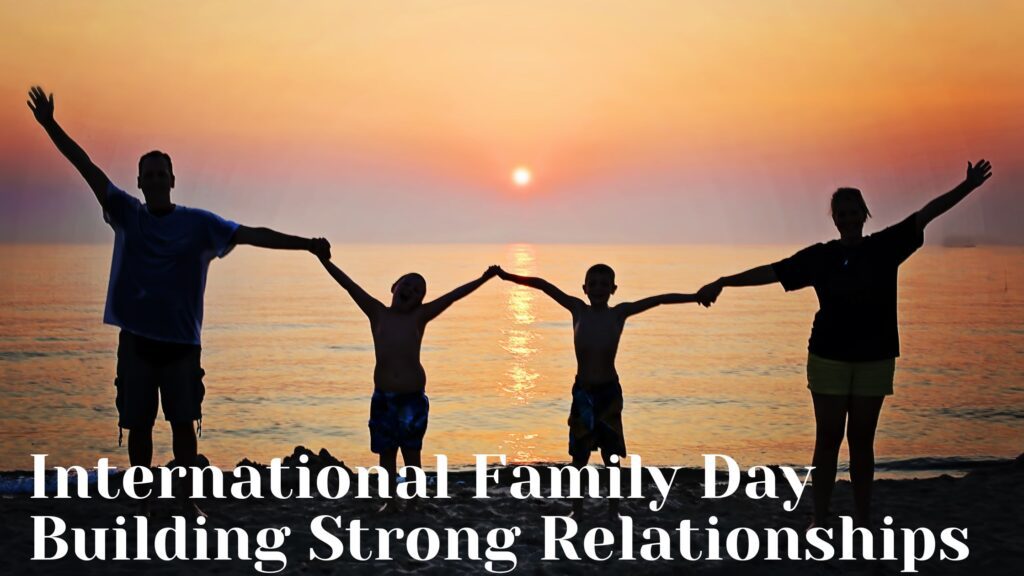
It’s International Family Day today. Family ties are important for a healthy and fulfilling life. To develop a happy life, one has to invest in relationships. Strong and healthy relationships are essential for a happy and fulfilling family life. They provide us with love, support, and a sense of belonging. They can help us to cope with stress, achieve our goals, and grow as individuals.
There are many things that we can do to build strong and healthy relationships. I am sharing a few simple and easy tips to develop better relations.
Communicate effectively:
Communication is the foundation of any strong relationship. Make sure that you are able to communicate your thoughts, feelings, and needs clearly and honestly. Be a good listener as well. Communication is the key to any successful relationship. It is important to be open and honest with your partner or friend and to communicate your thoughts and feelings clearly. Listening is also a crucial part of communication. Be an active listener and try to understand the other person’s perspective.
Be respectful:
Treat your family members with respect, even when you disagree. This means being mindful of their feelings and opinions and avoiding name-calling, insults, and other forms of verbal abuse. Respect is a crucial element of a healthy relationship. It means valuing the other person’s feelings, thoughts, and opinions. Show respect by listening to them, acknowledging their feelings, and avoiding judgment or criticism.
Be supportive:
Be there for your family members when they need you, and offer them your love and support. This means being there for them both emotionally and physically.
Be forgiving:
Everyone makes mistakes. If any member of your family does something to hurt you, be willing to forgive them. Forgiveness is essential for maintaining a healthy relationship. Forgiveness is essential in any relationship. No one is perfect, and mistakes will be made. It’s important to be willing to forgive and move past these mistakes. Holding onto grudges will only damage the relationship in the long run.
Spend time together:
Make time for your family members, both during the week and on weekends. This means going on dates, talking on the phone, and simply spending time together in each other’s company. Spending quality time with your partner or friend is crucial for building a strong connection. This can include date nights, shared hobbies, or simply enjoying each other’s company. Make sure to prioritize quality time in your schedule and show your partner or friend that they are important to you.
Make time for yourself:
It is also important to make time for yourself, both as an individual and as a family. This means having your own hobbies and interests and spending time with friends and family.
Seek help if needed:
If you are struggling to build or maintain a healthy relationship, don’t be afraid to seek professional help. A therapist can provide you with the tools and support you need to improve your relationships.
Approach conflict in a positive way:
Conflict is a normal part of any relationship. It’s important to be able to approach conflict in a positive way and to work together to find a solution that works for everyone involved.
Compromise:
Compromise is a necessary part of any relationship. No two people are the same, and conflicts will inevitably arise. It’s important to find a middle ground that works for both parties and to be willing to make sacrifices for the sake of the relationship.
Be honest and trustworthy:
Trust is essential for any relationship to thrive. We need to be able to trust that the other person is honest with us and that they will always have our best interests at heart. Trust is the foundation of any strong relationship. Without trust, it’s hard to build a deep and meaningful connection. It’s important to be reliable and keep your promises. Be open and transparent with your family members or friends, and trust will naturally follow.
Independence:
While it’s important to spend time together as a family, it’s also important to maintain your independence. This means pursuing your own hobbies and interests and respecting your partner’s/ family’s need for space. A healthy relationship should not be suffocating or codependent.
Be yourself:
Don’t try to be someone you’re not. The people who love you will love you for who you are.
Be positive:
Being positive is crucial for developing and maintaining healthy relationships with others. A positive attitude can help you build trust, foster intimacy, and create a supportive environment for those around you. When you approach relationships with a positive outlook, people tend to trust you more easily. It can signal to others that you are sincere, reliable, and have their best interests at heart.
Being positive is essential for developing and maintaining healthy relationships. A positive attitude can help you build trust, foster intimacy, create a supportive environment, and increase resilience. By maintaining a positive outlook, you can improve your relationships and create a happier, more fulfilling life.
Be grateful:
Being grateful is essential for developing and maintaining healthy relationships. Expressing gratitude can show appreciation, build trust, strengthen relationships, improve communication, and enhance well-being. By cultivating a sense of gratitude, we can create deeper and more meaningful connections with others.
Have fun!
Relationships should be enjoyable. Make sure to laugh and have fun together.
In conclusion, building strong and healthy relationships requires effort, time, and commitment. Communication, trust, respect, compromise, quality time, forgiveness, and independence are all crucial elements. By making a little and consistent effort, you can build deep and meaningful connections that will last a lifetime.
